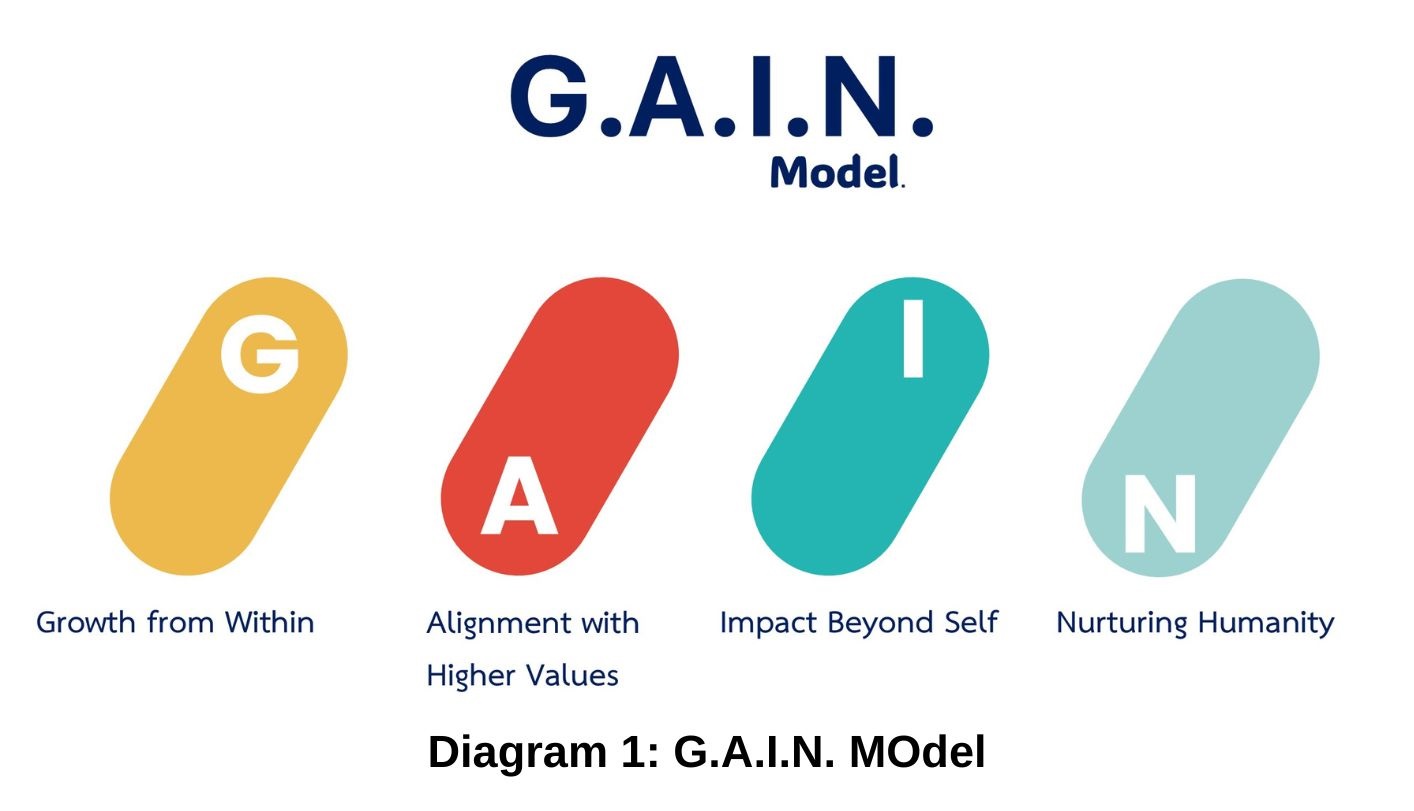The Application of the 16th Royal Working Principle : Our loss is our gain
Keywords:
Application, the 16th Royal Working Principle, Our loss is our gainAbstract
This article aims to conceptually analyze the 16th Royal Work Principle, “Loss is Gain,” through the philosophical lens of the Inner Development Goals (IDGs) and the Sufficiency Economy Philosophy. The study employs conceptual analysis and a literature review to develop a practical application model suitable for individuals, organizations, and society. Findings reveal that sacrificing personal benefits for the common good is not a loss but rather an investment in deeper, more sustainable values. The study introduces the G.A.I.N. model, which comprises four core dimensions: (1) Growth from Within – personal development through sacrifice and generosity; (2) Alignment with Higher Values – commitment to moral integrity and righteousness; (3) Impact Beyond the Self – creating positive social impact; and (4) Nurturing Human Qualities – cultivating compassion and empathy. These elements align with the IDGs’ emphasis on inner transformation as a foundation for sustainable external change. Ultimately, selfless acts contribute to meaningful and lasting value in life.
References
ชัญญานุช โมราศิลป์ และทักษญา สง่าโยธิน. (2562). แนวทางการน้อมนำหลักการทรงงานของพระบาทสมเด็จพระปรมินทรมหาภูมิพลอดุลยเดช บรมนาถบพิตร ไปใช้ในการปฏิบัติงานขององค์กรธุรกิจ. วารสารเวริดิยัน มหาวิทยาลัยศิลปากร, 12(1), 710–726.
บัณฑิต เสาวภาภรณ์, ทักษญา สง่าโยธิน และลลิต ถนอมสิงห์. (2562). การศึกษาหลักการทรงงานในพระบาทสมเด็จพระบรมชนกาธิเบศร มหาภูมิพลอดุลยเดชมหาราช เพื่อใช้เป็นแนวทางในการปฏิบัติงานกิจการเพื่อสังคม. วารสารการเมือง การบริหาร และกฎหมาย, 13(1), 311–313.
พระอธิการสุรเดช ธมฺมทินฺโน (วโรรส). (2567). การศึกษาวิเคราะห์การให้ทานที่ปรากฏในคัมภีร์วิมานวัตถุ. วารสารวิสัยทัศน์ทางปรัชญา, 29(1), 180–198.
เมธา หริมเทพาธิป, ชัยโรจน์ นพเฉลิมโรจน์ และวัชรารัศมิ์ สุนทรวนาเวศ. (2566). ภูมิสังคม: การศึกษาเชิงวิเคราะห์ วิจักษ์ และวิธาน. วารสารวิจัยธรรมศึกษา, 6(2), 64–66.
เมธา หริมเทพาธิป และรวิช ตาแก้ว. (2566). สังคมแห่งการแบ่งปันตามหลักปรัชญาของเศรษฐกิจพอเพียง: การศึกษาเชิงวิเคราะห์ วิจักษ์ และวิธาน. วารสารพุทธมัคค์, 8(1), 54–56.
รักติบูล จันทนุปาน. (2567). แนวทางการประยุกต์ใช้หลักการทรงงานของพระบาทสมเด็จพระเจ้าอยู่หัวรัชกาลที่ 9 เพื่อพัฒนาการท่องเที่ยวโดยชุมชนในชุมชนบนพื้นที่สูงบ้านปางต้นผึ้ง. วารสารวิชาการและวิจัยสังคมศาสตร์, 19(3), 119–121.
ศิริ ถีอาสนา และเสน่ห์ คำสมหมาย. (2560). อภิธานศัพท์: ศาสตร์พระราชา (ในหลวงทรงสอนอะไร). วารสารมหาวิทยาลัยราชภัฏมหาสารคาม, 11(ฉบับพิเศษ), 19–32.
สุพิชฌาย์ พรพิชณรงค์, พระเทพวชิรโกศล (เทพธีรวงศ์ ไกรวาสไชยวงษ์) และพระธรรมวชิราจารย์ (สุชาติ หวลจิตต์). (2567). การบูรณาการหลักพุทธธรรมและศาสตร์พระราชาเพื่อพัฒนาชุมชนหมู่บ้านเศรษฐกิจพอเพียง บ้านศรีไคออก ตำบลเมืองศรีไค อำเภอวารินชำราบ จังหวัดอุบลราชธานี. วารสารนวัตกรรมการจัดการศึกษาและการวิจัย, 6(3), 610–611.
สำนักงานคณะกรรมการพิเศษเพื่อประสานงานโครงการอันเนื่องมาจากพระราชดำริ. (2559). หลักการทรงงานในพระบาทสมเด็จพระบรมชนกาธิเบศร มหาภูมิพลอดุลยเดชมหาราช บรมนาถบพิตร. (พิมพ์ครั้งที่ 11). กรุงเทพฯ : สำนักงาน กปร.
Kant, I. (1785). Groundwork of the Metaphysic of Morals (Patton, H.J., Trans.). London: Routledge.
Lyotard, J. F. (1984). The Postmodern Condition: A Report on Knowledge. Minneapolis: University of Minnesota Press.
Ankrah, D., Bristow, J., Hires, D.& Henriksson, J. A. (2023). Inner development goals: From inner growth to outer change. Field Actions Science Reports, (25), 82–87.

Downloads
Published
How to Cite
Issue
Section
License
Copyright (c) 2025 Institute of Sufficiency Journal

This work is licensed under a Creative Commons Attribution-NonCommercial-NoDerivatives 4.0 International License.



